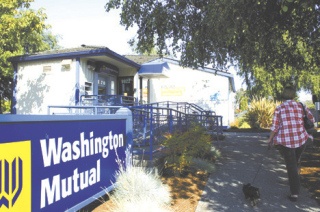With news of the stock market crashing, the financial world teetering and Washington Mutual suddenly under new ownership, Dan Little, a carpenter and WaMu customer, said he decided to drop in on his bank on Monday to make sure “all the faces are the same.”
“They are,” he said as he sauntered out of the small bank across the street from the Vashon post office. “They look busy, but fine.”
And so it went on one of the more frenetic days at what is still called WaMu but will presumably soon change its name to Chase: Islanders bopped in throughout the day — much as they did last week when news of WaMu’s impending collapse began to gather steam — making sure their bank accounts were safe, talking to tellers they’d known for years and, in some instances, taking their money out and depositing it elsewhere.
But most, in fine Vashon tradition, said they felt calm and relaxed despite the banner headlines and round-the-clock updates on what is being called the largest bank failure in the country’s history. Several joked that their meager accounts — well below the Federal Deposit Insurance Corp.’s $100,000 insurance ceiling — weren’t really enough to worry about.
“The little bit I have in here — they aren’t going to steal it,” said Ken Van Fleet, who headed into the bank with his chihuahua Rosco at his side.
Noting that a name change won’t deter him, he added, “I’ll keep coming here until they throw me out.”
Others echoed their loyalty to WaMu’s staff, a group of mostly women who offer biscuits to dogs and chat amiably with longtime customers.
“I know most of the people who work here, and I feel more for them than I do for my money,” said Cliff Penwell, a management consultant and editor.
“For my small amount of investments, I’m not worried,” he added. “If I had millions, maybe I would be.”
WaMu has long been a popular bank on the Island, and according to the most recent FDIC reports, it commanded a healthy share of the Vashon market.
As of June 2007, the WaMu branch on Vashon boasted a little more than 50 percent of the deposits (in terms of their monetary value); Bank of America had a little more than 28 percent of the market, and US Bank held about 21 percent.
News accounts are full of speculation about what might happen now that the Seattle-based thrift has been
sold to JP Morgan Chase. With nearly 6,000 employees in Washington state alone, WaMu played a key role in the region’s economy, and the impact of its demise — should layoffs occur — could hit the region hard.
But on Vashon, it’s possible the bank’s dramatic sale a day after federal regulators seized its assets will have little impact on consumers, said Matthew Parrish, a financial advisor with the Edward Jones office on the Island.
“My understanding is that the customers of Washington Mutual don’t have much to worry about,” Parrish said. “My understanding is that they’re fine.”
The only consumers who lost out in the process are the stockholders, “whose investments are worth basically zero now,” Parrish said.
And yet even shareholders — were they abiding by the longtime wisdom of holding quality stocks and diversified investments — will ultimately be OK, he added.
“As long as it was part of a diversified group of stock, it shouldn’t have a major impact on anyone,” Parrish said.
At the WaMu branch, with a long line of customers and a buzz in the air, employees said they couldn’t talk to a reporter, referring questions to Chase’s media relations office in New York.
A handout, posted on the door and available on the counter, sought to reassure customers, although it seemed surreal in light of the week’s worth of news stories on the nation’s financial crisis.
“Exciting news for our customers!” it began. “We’re proud to announce that WaMu has become part of one of the nation’s strongest banks.”
Some admitted to a bit of concern about the upheaval. One customer said she was taking out a small sum of cash, just to make sure she had it on hand should more bad news hit the markets.
Others were philosophical about the ordeal, noting that a frenetic psychology was adding to the crisis.
“I’m not going to change my account, at least right now,” said Claire Bronson, a designer and artist.
That could change, however, once the tumult is over, she added.
“I felt some brand loyalty to WaMu,” she said. “I won’t to JP Morgan.”



